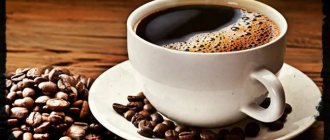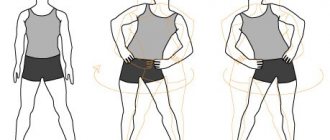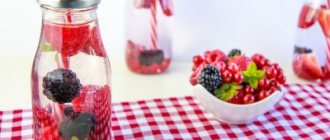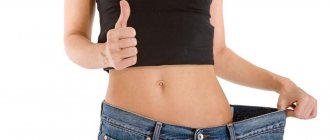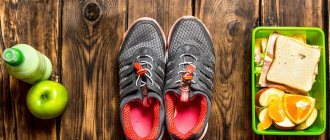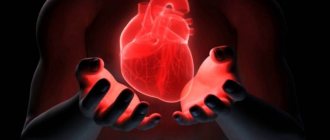Why do you need breakfast?
The quantity and composition of food must be chosen correctly: an overloaded stomach will not allow you to perform exercises in full, and nausea and vomiting may occur.
After a night's sleep, the level of glucose in the blood decreases, which serves as a source of nutrition for the brain and muscles. The reserves of glycogen, a complex carbohydrate that acts as a kind of reserve storage for glucose, are also depleted. The main amount of glycogen is deposited in the liver and muscles.
During physical activity, when there is a lack of glucose, the brain sends a “distress” signal, and glycogen begins to break down into glucose molecules to provide the body with energy.
If you train on an empty stomach, then with a lack of glycogen, muscle fibers suffer. Fatigue and malaise appear, endurance decreases. Systematic repetition of this situation can lead to exhaustion of the body and even provoke diseases.
Eating breakfast 1-2 hours before training will help restore the necessary supply of nutrients.
Pre-workout meal timing is fundamental
Meal timing is also an important aspect of pre-workout nutrition. To maximize the results of your workout, try eating a meal containing carbohydrates, protein, and fat 2-3 hours before your workout.
However, if you are unable to eat a full meal 2-3 hours before your workout, you can still eat a decent meal before your workout. However, keep in mind that the less time left before training, the smaller the portion and the more easily digestible the food should be.
If you eat 45 to 60 minutes before your workout, choose foods that are easy to digest and contain mostly carbohydrates and some protein. This will help prevent stomach discomfort during exercise.
Summary:
It is recommended to eat a full meal 2-3 hours before training. The less time left before your exercise, the more easily digestible your food should be.
Features of breakfast before training for weight loss
When determining the amount of food and the time of its intake, focus on the well-being and individual characteristics of your body.
The main goal of weight loss exercises is not to pump up muscles, but to eliminate excess fat accumulation. During training, you must have sufficient glycogen fuel. Therefore, the morning menu must include foods containing carbohydrates.
You should not eat food with a high concentration of simple (fast) carbohydrates - sugar, sweets, confectionery. Such food contributes to a sharp increase in blood glucose, but by the beginning of the workout it decreases just as quickly, and you will not have the strength for long-term aerobic exercise.
Foods with a low glycemic index, which include complex carbohydrates, are much healthier. These include:
- grain bread, dietary cookies, cereal breads;
- light porridges – oatmeal, buckwheat;
- fruits, berries, vegetables;
- garden greens;
- nuts (walnuts, cashews, pine);
- legumes (beans, lentils, peas).
Complex carbohydrates are absorbed more slowly by the body and provide a gradual release of glucose into the blood. Preference should be given to products with a glycemic index of less than 60.
Don't forget about proteins in your morning menu. In combination with carbohydrates, they are perfectly absorbed and help reduce the overall glycemic index. Without the amino acids supplied by protein foods, muscles weaken and fat deposits quickly return.
You can eat low-fat cottage cheese, lean meat, poultry, and boiled fish. Omelette and fermented milk products are healthy. The optimal ratio of carbohydrates and proteins for successful aerobic training is 60% carbohydrates and 40% protein. The amount of fat in the morning diet should be reduced to a minimum.
An approximate menu for the week, taking into account BZHU (proteins, fats, carbohydrates) and caloric content of portions, is presented in the table.
| Day of the week | Menu | Proteins, g | Fats, g | Carbohydrates, g | Calorie content |
| Monday | Natural yogurt – 1 glass, blueberries – 100 g, banana – 1 pc. | 14 | 1 | 28 | 173 |
| Tuesday | Whole grain bread – 1 piece, chicken breast – 70 g, tomato – 1 piece, greens. | 15 | 7 | 25 | 220 |
| Wednesday | Chilled coffee – 150 ml, protein shake – 1 dosage spoon. | 26 | 2 | 7 | 150 |
| Thursday | Low-fat cottage cheese with berries - 100 g, banana - 1 pc. | 14 | 0,1 | 13 | 117 |
| Friday | Celery salad – 200 g + almond oil – 2 dessert spoons. | 7 | 10 | 10 | 206 |
| Saturday | Boiled turkey fillet – 100 g, cabbage salad – 150 g. Apple – 1 pc. | 25 | 2 | 15 | 185 |
| Sunday | Omelette of 2 eggs with vegetables, grapefruit. | 20 | 12 | 14 | 315 |
The serving size may be normal for you if you can have breakfast 2 hours before training. During this time, the food will be digested, the body will be saturated with the necessary nutrients, and the workout will be easy.
When there is not enough time, you can eat a small grain bread and drink a glass of kefir 1-1.5 hours before the start of classes. Before training in the early morning, 35-40 minutes before it, it is permissible to have a snack with an apple or banana, a small amount of low-fat cottage cheese, and drink a glass of tea.
Breakfast before strength training
Controlling the amount of food consumed and the distribution of micro and macroelements is not easy, and at this time of day it is especially difficult to do. If you eat too much, you will feel a heaviness in your stomach and weakness soon after starting your workout. If you eat too little, you won't have the energy to do a good workout. What to eat for breakfast to provide your muscles and body with everything they need?
How to nourish your muscles correctly
Eat protein
If you go out in a hurry in the morning, don't eat breakfast, and train on an empty stomach, you're robbing yourself of the opportunity to protect your muscles from breakdown. About 3 hours after eating a protein-rich meal, the body returns to a negative protein balance. Thus, after 8 hours of sleep, the body is further exposed to catabolism . Preventing its negative effects is simple - eat protein before training! Amino acids, with which protein is broken down, quickly promote muscle recovery, help in regeneration and building muscle mass.
Any source of lean protein is a good choice. This could be egg whites or lean meat . However, you can also choose a quick source of protein, such as BCAA amino acids or a protein shake, to minimize the risk of digestive discomfort.
Carbohydrates - as a source of energy
Carbohydrates are the main source of energy. The work of muscles and the brain is possible thanks to glucose, that is, sugar, to which both complex and simple carbohydrates are broken down. Carbohydrates that are not immediately consumed as fuel are stored in the liver or muscles as glycogen and can be used later when energy demand is high (for example, during exercise).
During sleep, glycogen stores are significantly reduced because they are consumed by the brain and nervous system to support vital functions. A morning workout without carbohydrates can be quite ineffective, leading to early fatigue and tiredness. In turn, eating too much or eating the wrong type of carbohydrates can also reduce your productivity.
Considering the morning pressure, you need to eat the right amount of food to avoid digestive discomfort. This is especially noticeable when we eat fiber-rich foods such as oatmeal or whole wheat bread. To maximize your energy supply and minimize stomach problems, choose carbohydrates that are easy to digest with some fiber: rice waffles, dried fruit or bananas are excellent choices. You can also mix a protein or BCAA supplement with added dextrose.
What to eat in the morning before training to gain muscle mass
You need to have breakfast 2-3 hours before training. If for some reason you do not have time to eat a full meal, use one of the sports nutrition complexes, for example, BCCA or whey protein. The necessary energy will be obtained without the risk of gastric discomfort.
Strength exercises require a lot of energy. An increase in bodybuilder muscle volume occurs due to increased consumption of protein foods, since protein amino acids are the building material for muscle fibers. No less important are carbohydrates - the main supplier of energy during high physical activity. Fats also cannot be excluded from the diet, otherwise lipid metabolism will be disrupted, which will not have the best effect on health.
The body best absorbs animal proteins contained in meat, fish, dairy dishes, and eggs. When choosing meat, priority is given to lean beef, chicken or turkey breast. Plant proteins are less useful for pumping up muscles, but fats, on the contrary, need vegetable fats - olive or sunflower oil, nuts.
It is recommended to consume carbohydrates slowly. Their suppliers are fruits and vegetables. Fast carbohydrates (sugar and other sweets) are indicated only in case of a sharp drop in blood glucose during prolonged strength training. A bodybuilder's diet should include 60% proteins and 40% carbohydrates. The amount of fat before morning exercise is limited.
The table shows examples of the morning menu before the upcoming workout.
| Day of the week | Menu | Proteins, g | Fats, g | Carbohydrates, g | Calorie content |
| Monday | Whole grain bread - 2 slices, 100 g boiled turkey, 1 slice of soft cheese, 1/2 tomato. | 40 | 15 | 45 | 470 |
| Tuesday | Whole grain oatmeal – 150-200 g, 1 scoop of protein powder. | 33 | 7 | 57 | 420 |
| Wednesday | Whole grain bread - 2 pcs., boiled chicken breast - 100 g, avocado - 1/2 pc., cucumber - 1/2 pc., soft cheese - slice. | 35 | 12 | 40 | 450 |
| Thursday | Omelette of 2 eggs + 2 whites with vegetables, grapefruit. | 26 | 18 | 13 | 330 |
| Friday | Potatoes with minced turkey (for 1 medium-sized potato – 150 g minced meat), bell pepper – ½ pc. | 35 | 13 | 37 | 405 |
| Saturday | Baked chicken fillet with broccoli -150 g, apple - 1 pc. | 59 | 8 | 36 | 380 |
| Sunday | Mix of unsalted nuts with olive oil, dried fruits and cinnamon – 250-300 g | 20 | 60 | 23 | 546 |
Protein before strength training
Does it help in gaining muscle mass or is it of little use?
As we all know, the amount of protein consumed per day directly affects the ability of muscles to grow. If you consume too little, you will not gain muscle mass.
Does it matter when you consume your protein? Is it useful immediately before training?
There are different strategies for pre-workout nutrition. The fact is that when we eat, the body needs several hours to digest and absorb the nutrients contained in the food.
The greater the amount eaten, the longer this period is (from 2 to more than 6 hours).
This means that if you eat enough protein two to three hours before resistance training, your plasma amino acid levels will be quite high during your training session. Therefore, additional protein intake before the workout itself will not bring any dividends, because the body is already in a state of anabolism.
On the other hand, if more than two hours have passed since the last meal, and the amount of protein was insufficient (less than 20 g), then the level of amino acids in the blood plasma may be low during heavy work in the gym. In this case, pre-workout intake of protein (protein) or gainer is necessary to stimulate muscle growth.
Most people work out either early in the morning or a few hours after lunch (after work, before dinner), and it is for this reason that it is recommended to take 20 to 30 grams of whey protein 30 minutes before training.
However, if it is possible to get these 20-30 grams of protein along with a full meal 2-3 hours before strength training, then there is no need to take protein before training.
The best sources of protein: meat, eggs, dairy products, fish.{banner_st-d-2}
How to balance your diet while building muscle mass
Natural products are the best option for a balanced diet for a bodybuilder. Choose the serving size for breakfast according to your individual needs. Consider your well-being and body characteristics.
For a person prone to obesity, the optimal ratio of dietary fat as a percentage of the daily amount of food will be: proteins - 55-70%, carbohydrates - 20-30%, fats - 3-5%. Thin people who have difficulty gaining weight can use a different proportion: proteins - 40-50%, carbohydrates - 40-50%, fats - 5-10%.
When purchasing food products, carefully study the data on the percentage of dietary fat on the packaging.
What drinks are better
Fitness enthusiasts often drink coffee with breakfast. Sometimes this is justified, as it stimulates the body to active functioning. You should not add cream and large amounts of sugar to coffee - the caloric content of the diet increases, and sugar (a fast carbohydrate) can lead to a sharp drop in glucose during training and a loss of strength.
Important! Don't forget about clean water. Immediately after sleep, drink 1-2 glasses, and during exercise, drink mineral or slightly salted water. This way you will prevent dehydration of the body and loss of mineral salts.
For those who like freshly squeezed juices, it is better to limit their consumption before training. Juices have almost no fiber, they stimulate appetite and cause fatigue during high physical activity. Juices should be supplemented with plant fiber and protein sources.
At breakfast you can drink a glass of kefir or milk, green or herbal tea. Store-bought juices and sweet carbonated drinks are completely excluded.
Sports nutrition
The sports nutrition market offers a huge range of products. But you need to approach your choice with extreme caution: if you have heart or vascular problems, endocrine disorders, gastrointestinal diseases, kidney dysfunction or high blood pressure, consult your doctor before using supplements.
The most popular sports nutrition products that can be used as a breakfast supplement:
- Thermogenics. Actively burn subcutaneous fat. They should be taken in courses of no more than 30 days, with 2-week breaks.
- L-carnitine. Promotes the loss of fat deposits, the growth of muscle mass, increases vitality and stress resistance.
- B.C.C.A. The supplement is a mixture of amino acids (valine, leucine, isoleucine), which play a leading role in the construction of muscle tissue. Suppresses catabolic (destructive) processes in muscles.
- Slow protein. Provides a continuous supply of amino acids, which reduces the likelihood of catabolic manifestations in the muscles during periods of high stress.
When choosing a supplement that is suitable for you, focus on products from well-known brands offered by specialized stores. This way you can avoid negative consequences for the body due to taking low-quality sports nutrition or counterfeits.
You should strictly follow the dosage and rules for using food additives specified in the instructions. Don't risk your health!
Why is breakfast before training so important?
Some people feel comfortable exercising on an empty stomach. Others believe that you need to eat well before physical activity. However, numerous studies have concluded that eating before any workout is essential. But you don’t need to start exercising immediately after eating - it’s important to give the body at least half an hour to digest.
It is also recommended to eat only light meals for breakfast that will not lead to bloating or cause heaviness. You can replace the usual bread and butter and sausages with smoothies and other cocktails that help invigorate the body and feel full.
But what about those who are not used to having breakfast? In fact, there are benefits to not eating before a workout. Exercising on an empty stomach is thought to burn more fat because the body doesn't rely on carbohydrates for fuel. But it’s still better not to risk your health and well-being and eat at least something before starting exercise.
TOP 5 pre-workout breakfast foods
1. Oatmeal . It has a low glycemic index, perfectly saturates the body with complex carbohydrates, and does not contain fat. Whole grain oatmeal is especially healthy.
2. Chicken eggs . A familiar product for a morning meal. Contains easily digestible natural protein. A classic omelet with garden herbs is an excellent breakfast option for a bodybuilder.
3. Turkey meat . It is low in cholesterol and fat. A good supplier of protein for muscle building.
4. Fruits and nuts . Particularly noteworthy are bananas, apples, pears, pineapple, and citrus fruits. Rich in fiber, complex carbohydrates, microelements. Nuts are a source of unsaturated fats, folic and omega-6 acids.
5. Cottage cheese and natural yogurt . Indispensable for replenishing protein and calcium reserves. In combination with fruits and berries they are a complete breakfast.


